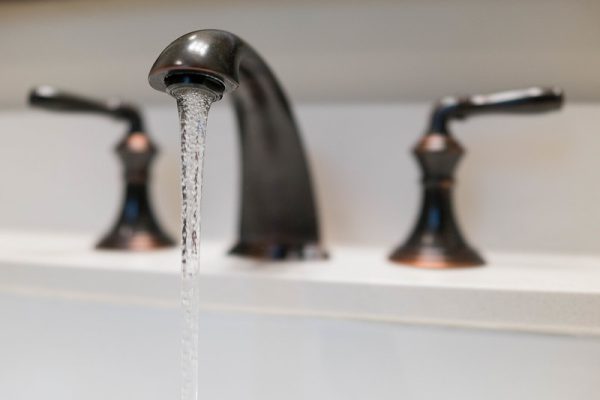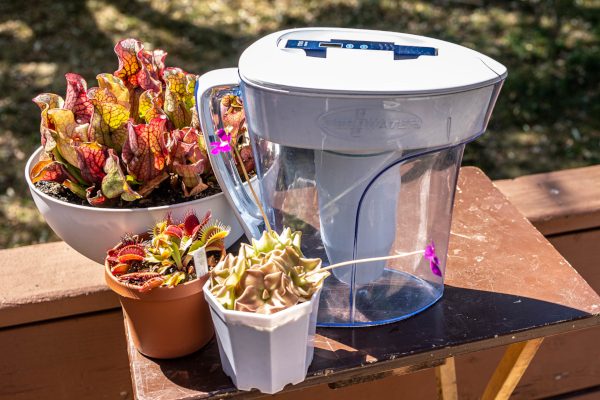Buy Carnivorous Plants Online!
Buy carnivorous plants from the most reputable and trusted carnivorous plant nursery, California Carnivores. We have partnered up and are giving all my viewers an exclusive 10% discount on your entire carnivorous plant order! Just enter CPHUB at checkout! Get the coolest venus flytrap cultivars, sarracenia, nepenthes and much MUCH more! You can even buy your next bag of premium carnivorous plant soil from them!
Order Plant Mail, Click Here!
Will Tap Water Kill A Venus Flytrap?
One of the most common mistakes people make is giving their venus flytrap tap water as soon as they get it home. In some rare instances, tap water might be okay but more often than not, tap water contains too many dissolved solids. These dissolved solids will burn the venus flytraps roots and slowly kill it. Tap water in most cases is toxic to a venus flytrap.

Know If Tap Water Is Safe With This Tool
It’s really important not to guess with your tap water. If you really want to know if you can give your venus flytrap tap water this tool will be necessary. Most tap water contains dissolved solids. These dissolved solids are potentially toxic to your venus flytrap. A TDS meter is a tool that allows you to measure those dissolved solids in your tap water.
Not only will you be able to measure the “TDS” or total dissolved solids to see if it’s okay to give your venus flytrap, this will also allow you to see if your water is safe for drinking out of the tap. TDS meters are extremely affordable, you can grab one off Amazon for around 10-15 dollars. The one I’ve linked below is the one I use personally and it has never steered me wrong.
They are extremely easy to use. You just stick the meter end into your water and it will display a reading. Make sure you only use the TDS meter when the water is room temperature. If the water is too hot or too cold it can skew the measurement.
You want water that is below 50 PPM to safely use for venus flytraps. If you use water that contains around 50 PPM you will want to repot your flytrap once a year. Even at that low, the dissolved solids will build up in the soil over time. You can flush the plant with distilled water to help flush the dissolved solids out. You can measure the water coming through the plant to see if there is a build up. I personally prefer not to use anything over 10 PPM, this extends the substrate and I have less build up .
Also, if you are interested in more venus flytrap care information, check out my complete guide to venus flytrap care! You can also check out how often you should water a venus flytrap.
Superior Options To Tap Water
You may want to consider some different options to tap water for watering a venus flytrap. You need water that has very little to no dissolved solids. Keep in mind that boiling water does not eliminate dissolved solids, only bacteria. It’s also important to note that most bottled waters do not eliminate dissolved solids. Some of them even add minerals for taste, which harm venus flytraps. I wanted to list some options below so you can find good water for your venus flytrap.
Distilled Water From Store
If you want to avoid giving your venus flytrap tap water this is one of the easiest options. The only problem is it’s availability. In the section of your grocery or big box store that sells water there is usually a section that sells distilled water by the gallon. It usually ranges from 70 cents to 2 dollars a gallon. The bigger issue than price is that stores are OFTEN out of distilled water. There is nothing more frustrating than going to the store to get water for your plants and its all sold out. You can buy 5 gallons at a time when it’s in stock, but it can be quite the hassle.
Zero Water Pitcher (My Favorite Option)

Since you should not be giving your venus flytrap tap water, one of the best options out there is a Zero Water Pitcher. This is a special water pitcher that eliminates all dissolved solids out of tap water so it’s safe for your venus flytrap. Keep in mind that not all water pitchers do this. Brita for example, will not get rid of dissolved solids. It takes a special filtration process to eliminate the dissolved solids.
If you want to learn more about how much water each filter produces and how the Zero Water pitcher works, check out my full video review below. I go in depth with the Zero Water Pitcher so you can see if it’s right for you. If you don’t want to watch the video you can also click the link below to check it out along with the reviews on Amazon!
One of the best benefits to getting a ZeroWater pitcher is that it comes with a free TDS meter for measuring water. Once you get your pitcher you can then also measure your tap water to see what the TDS levels are.
- Check Your TDS: The 10 Cup 5-Stage Ready-Pour Water Filter Pitcher Dispenser has a TDS Meter to check the levels of dissolved solids before dispensing or pouring water – always know when it is time to change your filter!
- Advanced Filtration: Our 5-Stage Ion Exchange Filter removes virtually all dissolved solids (TDS) for the purest tasting water; Total Dissolved Solids are organic and inorganic materials, such as metals, minerals, salts, and ions dissolved in water.
- IAPMO Certified & BPA-Free: Our 5-Stage filter is IAPMO Certified to reduce PFOA/PFOS, lead, chromium, and mercury. All Culligan ZeroWater products are made from BPA-Free plastic.
- Your New Water Filter System: Your purchase includes a 10 Cup water filter pitcher dispenser, 5-Stage Ion Exchange Water Filter, and a TDS meter that read TDS level. Compatible with ZeroWater & Culligan ZeroWater systems and filters.
- Less Plastic, More Hydration: You can save up to 110 single-use plastic bottles per filter or up to 660 bottles a year while enjoying the purest tasting water with your Culligan Zero Water Filter System.
Last update on 2024-12-23 / Affiliate links / Images from Amazon Product Advertising API
https://youtu.be/q3Iik5-B1Z4Collect Rain Water For Venus Flytrap Instead Of Tap Water
In most cases, rainwater is a better option than tap water for your venus fltyraps. It should be noted however that even rain water can be contaminated in more polluted areas. It still might be a good idea to grab a TDS meter to measure your rain water before committing to using it. I’t’s also good to point out that most people collect rainwater off of a roof of some sort. Sometimes gutters and roofs can collect chemicals that could be harmful to a venus flytrap.
Rainwater is probably a good option but I’d recommend going with distilled water or the Zero Water pitcher above, just to be more safe. You’re venus flytrap is too precious to risk giving chemicals from roof collected rain water.
Reverse Osmosis System
The absolute best option but least cost effective option is installing a reverse osmosis system. This is the option you would want if you have 50 or more carnivorous plants in your collection. This is not necessary for most people but is definitely an option. The nice thing about having the reverse osmosis system installed on your tap water is the benefits of both it being clean drinking water and good for your venus flytrap.
They can be a little more expensive and still require filter replacements after so much use. You could reserve whichever sink you install if under to be just for carnivorous plants. This will ensure that you are never wasting the RO clean water. The Zero Water Pitcher is a much more affordable option. But if you want to really improve your drinking water and have a large source of zero PPM water, a reverse osmosis system might before you.
Check out the system I recommend below!
Conclusion
Can a venus flytrap have tap water? In most cases no… Unfortunately venus flytraps are a little too sensitive to dissolved solids to use tap water. Watering is one of the trickiest parts of growing healthy venus flytraps. I go in depth on everything water in my ultimate venus flytrap watering guide. It’s really in depth and gives you all the ins and outs of watering. I strongly recommend checking it out so you can learn how and when to water a venus fltyrap.
https://youtu.be/hfQKNffFp3s
There are other things you need to know about growing healthy venus flytraps but learning the ins and outs of watering is really important. Understanding how tap water impacts your venus flytrap is really important. Knowing the dissolved solids in your tap water is necessary when deciding if you are going to use it. Getting a TDS meter will be necessary if you plan on using tap water.
You can technically give venus flytraps tap water but you are taking a huge risk and gamble if you do it without a TDS meter.
For more great info, check out my YouTube channel Carnivorous Plants Hub where I bring you all kinds of great carnivorous plant care, unboxing and more!



